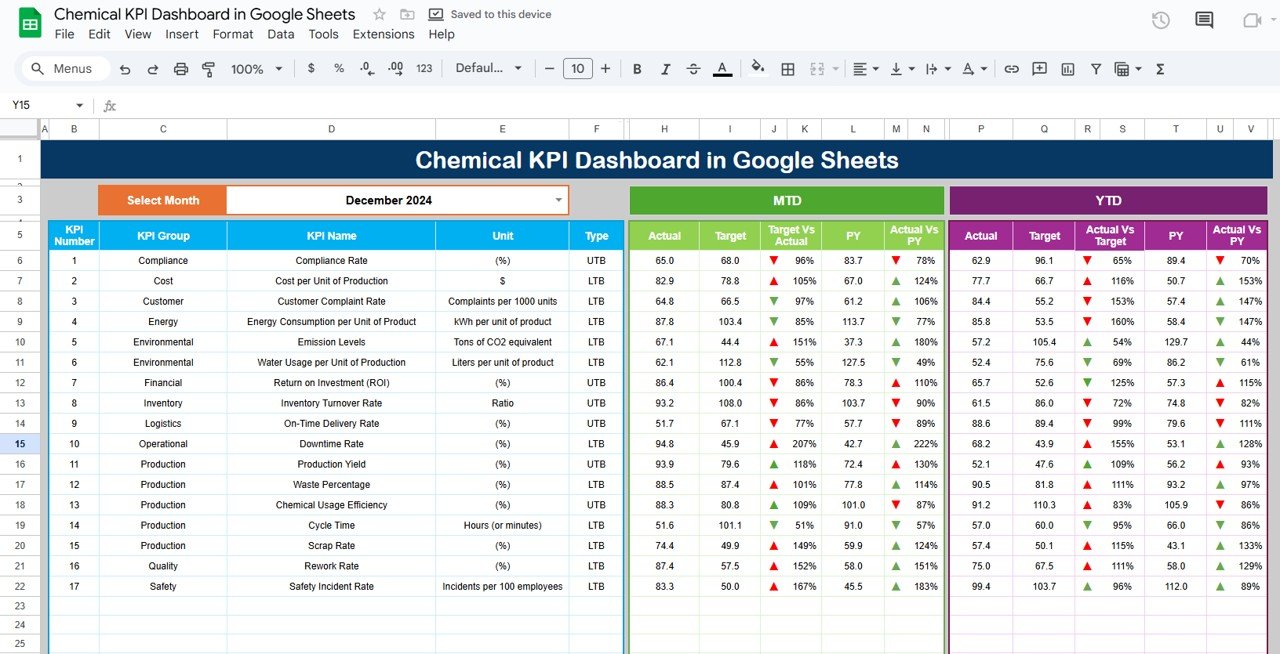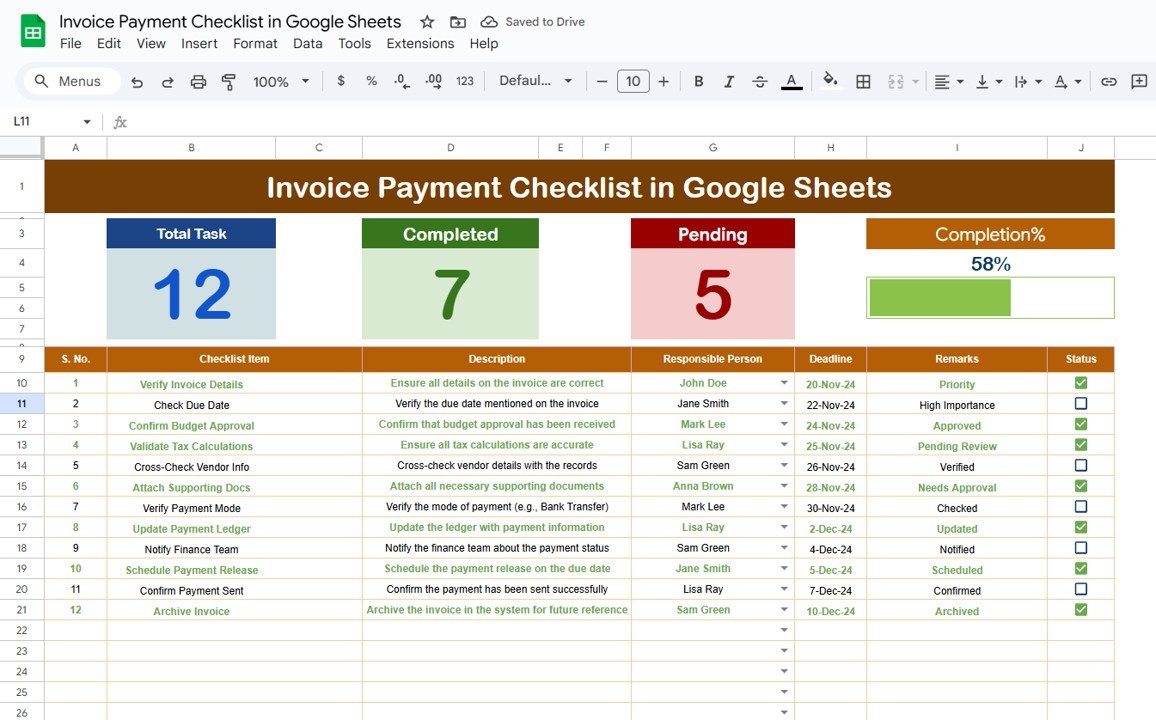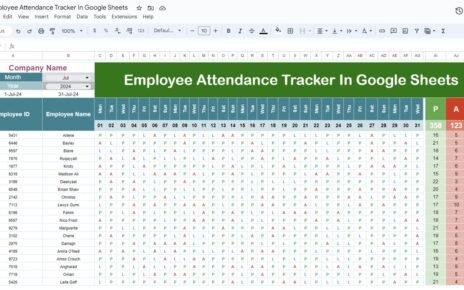In this article, we will explore the Chemical KPI Dashboard in Google Sheets—a ready-to-use template designed to help chemical businesses track essential KPIs. This dashboard enables businesses to monitor performance in real-time, compare actual data with targets, and make data-driven decisions for process improvements.
Key Features of the Chemical KPI Dashboard in Google Sheets
Before diving into the specifics of the KPIs, let’s first understand the key features of this dashboard template:
1. Dashboard Sheet Tab
This is the main sheet where all the KPI data is displayed. Key features include:
-
MTD (Month-to-Date) Actual vs Target: Displays the current month’s data against the target.
-
YTD (Year-to-Date) Actual vs Target: Shows a cumulative view of the year’s performance.
-
Previous Year Comparison: Compares the current year’s data with the same period in the previous year, with conditional formatting (up or down arrows) for easy visual interpretation.
-
Dynamic Month Selection: Use the drop-down menu (in Range D3) to select the month, and the data in the dashboard will automatically update.

Click to buy Chemical KPI Dashboard in Google Sheets
2. KPI Trend Sheet Tab
Here, you can select a KPI name from the drop-down list (available in Range C3). Each KPI is displayed with the following details:
-
KPI Group
-
Unit of Measure
-
KPI Type (Lower the Better or Upper the Better)
-
Formula to Calculate the KPI
-
KPI Definition

Click to buy Chemical KPI Dashboard in Google Sheets
3. Actual Numbers Sheet Tab
This tab allows you to enter the actual numbers for MTD and YTD. Select the month from the drop-down menu (Range E1) and input the numbers for that month. The data will automatically adjust.

Click to buy Chemical KPI Dashboard in Google Sheets
4. Target Sheet Tab
Here, you enter the target values for each KPI for both MTD and YTD. This helps track performance against goals.

5. Previous Year Numbers Sheet Tab
This tab holds the previous year’s data, allowing for year-over-year comparisons. Enter the same type of data as the current year for accurate analysis.

6. KPI Definition Sheet Tab
In this sheet, you define each KPI with the following details:
-
KPI Name
-
KPI Group
-
Unit of Measure
-
Formula Used to Calculate the KPI
-
KPI Definition

Click to buy Chemical KPI Dashboard in Google Sheets
Advantages of Using the Chemical KPI Dashboard in Google Sheets
The Chemical KPI Dashboard in Google Sheets offers several advantages to businesses in the chemical industry:
-
Real-Time Data Tracking: Monitor key performance indicators in real time, enabling quicker decision-making and efficient management.
-
Comprehensive Overview: The dashboard consolidates all essential KPIs in one place, providing a comprehensive view of production, efficiency, and quality.
-
Customizable Template: The dashboard can be easily customized to fit your specific needs, allowing you to add or remove KPIs and adjust formulas.
-
Cost-Effective: Google Sheets is free to use, making this solution affordable for businesses of any size.
-
Collaboration Features: Google Sheets allows for easy sharing and collaboration with team members, making it easier to keep everyone updated on performance.
Opportunities for Improvement in the Chemical KPI Dashboard
While the Chemical KPI Dashboard in Google Sheets is a powerful tool, there are always opportunities to improve its functionality:
Automated Data Entry
-
Current Challenge: Manual entry of data can be time-consuming and prone to error.
-
Opportunity: Integrate the dashboard with other systems like ERP or production management software to automate data collection.
Enhanced Visualizations
-
Current Challenge: The current dashboard may not be visually engaging for all users.
-
Opportunity: Add more advanced visualizations such as sparklines, bar charts, and pie charts to make the data more visually appealing and easy to interpret.
Advanced Reporting Features
-
Current Challenge: Basic reporting features may not meet all business needs.
-
Opportunity: Implement advanced reporting options, such as automated report generation, customizable templates, and export to PDF.
Best Practices for Using the Chemical KPI Dashboard
Click to buy Chemical KPI Dashboard in Google Sheets
To maximize the effectiveness of the Chemical KPI Dashboard in Google Sheets, consider these best practices:
-
Update Data Regularly: Ensure the dashboard is updated at least once a month to reflect the latest production and performance data.
-
Use Consistent Naming Conventions: Maintain consistency in naming KPIs, units, and formulas to avoid confusion and ensure clarity.
-
Set Realistic Targets: Set achievable targets based on historical performance data to drive improvements without overwhelming the team.
-
Encourage Collaboration: Share the dashboard with relevant team members to foster collaboration and ensure that everyone is aligned on performance goals.
-
Leverage Conditional Formatting: Use color coding and conditional formatting to visually highlight performance trends and make data interpretation easier.
Conclusion
The Chemical KPI Dashboard in Google Sheets is an essential tool for tracking performance in the chemical industry. By using this template, businesses can efficiently monitor key metrics such as production efficiency, energy consumption, and waste generation, leading to better decision-making and improved performance.
Frequently Asked Questions (FAQs)
What is a KPI in the chemical industry?
A KPI (Key Performance Indicator) is a measurable value that demonstrates how effectively a company is achieving its business objectives. In the chemical industry, KPIs could include production efficiency, waste generation, and product quality defects.
How can I customize my Chemical KPI Dashboard?
You can easily customize the dashboard by adding or removing KPIs, adjusting formulas, and changing data sources based on your company’s specific requirements.
How do I enter data into the Chemical KPI Dashboard?
Data can be entered into the appropriate tabs for actual numbers (MTD, YTD), targets, and previous year comparisons. Simply update the data for each month to keep the dashboard up to date.
Can I automate data entry in the dashboard?
Yes, you can integrate Google Sheets with other systems like ERP or production management software to automate data entry and reduce manual effort.
What KPIs should I track in the chemical industry?
Key KPIs to track in the chemical industry include production efficiency, waste generation, energy consumption, product quality, and chemical compliance.
Visit our YouTube channel to learn step-by-step video tutorials
Youtube.com/@NeotechNavigators
Watch the step-by-step video Demo:



